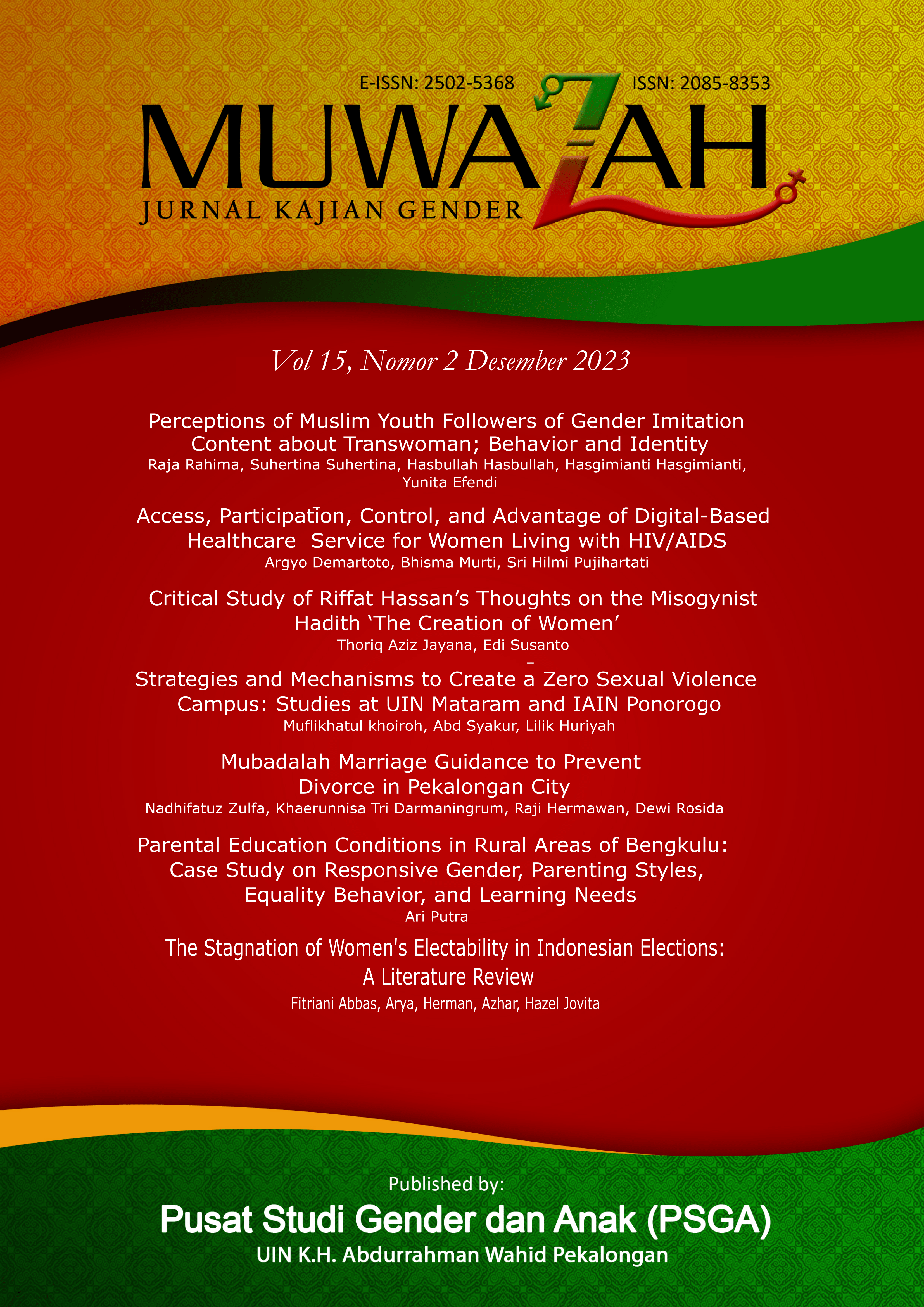Parental Education Conditions in Rural Areas of Bengkulu: Case Study on Responsive Gender, Parenting Styles, Equality Behavior, and Learning Needs
DOI:
https://doi.org/10.28918/muwazah.v15i2.2012Keywords:
Parental Education, Responsive Gender, Rural Area, Equality Behavior, Parenting StyleAbstract
This study is to examine the understand the awareness and knowledge of the community in these areas regarding gender issue, which crucial for informing government policies on community education. This scientific paper employs a qualitative approach to comprehensively describe the nuanced experiences of parental education in Bengkulu, Indonesia. The research was conducted in three rural area Bengkulu Province located on Sumatra Island, Indonesia. parental education in rural areas is hindered by persistence of traditional gender roles that assign distinct responsibilities to women and men. the study revealed that there are distortions in the community understandings of gender in rural Bengkulu. The distortions manifest as a lack of awareness and understanding of gender issues, resulting in inadequate child-parent interaction, especially among fatherless families, perpetuation of gender stereotypes and a deficiency in gender-responsive literacy. The findings indicate that parental education in rural areas is hindered by persistence of traditional gender roles that assign distinct responsibilities to women and men. Understanding the condition of parental education and gender responsiveness in rural Bengkulu is very important because it is directly related to government policy making in the field of public education. This report highlights the importance of promoting gender equality, combating stereotypes, and improving parent education in rural areas to create a more inclusive and responsive educational environment.
References
Anisman-Razin, Moran, Ronit Kark, and Tamar Saguy. 2018. “‘Putting Gender on the Table’: Understanding Reactions to Women Who Discuss Gender Inequality.” Group Processes & Intergroup Relations 21(5):690–706. doi: 10.1177/1368430217744648.
Atkinson, Brian R., and Donald G. Ogston. 1974. “The Effect of Father Absence on Male Children in the Home and School.” Journal of School Psychology 12(3):213–21. doi: https://doi.org/10.1016/0022-4405(74)90033-8.
Behrman, Jere R. 1999. “L a b o r Markets in d e v e l o p i n g Countries.” Science 3:2859–2939.
Ceka, Ardita. 2016. “The Role of Parents in the Education of Children.” 7(5):61–64.
Cerrato, Javier, Eva Cifre, and Anna Maria Dåderman. 2018. “Gender Inequality in Household Chores and Work-Family Conflict.” 9(August):1–11. doi: 10.3389/fpsyg.2018.01330.
Ding, Xu, Lin Zheng, Yutong Liu, Wenya Zhang, Naiyi Wang, Hongxia Duan, and Jianhui Wu. 2023. “Parenting Styles and Psychological Resilience: The Mediating Role of Error Monitoring.” Biological Psychology 180(May):108587. doi: 10.1016/j.biopsycho.2023.108587.
Drury, Kate Mills, and William M. Bukowski. 2013. “Chapter 5 - Sexual Development.” Pp. 115–44 in, edited by D. S. Bromberg and W. T. B. T.-H. of C. and A. S. O’Donohue. San Diego: Academic Press.
Fajarrini, Arsyia, and Aji Nasrul. 2023. “DAMPAK FATHERLESS TERHADAP KARAKTER ANAK DALAM PENDAHULUAN Anak Menjadi Generasi Penerus Bangsa , Maka Dari Itu Anak Perlu Mendapat Perhatian Dan Pendidikan Yang Baik . Pendidikan Karakter Pada Anak Berawal Dari Usia Dini , Apabila Sejak Kecil Sudah Diara.” Pendidikan Islam Anak Usia Dini 3(1):20–28.
Fletcher, C. 1989. “Community Education and Community Development.” Pp. 51–54 in Advances in Education, edited by C. J. B. T.-L. E. for A. TITMUS. Amsterdam: Pergamon.
García Coll, Cynthia, Daisuke Akiba, Natalia Palacios, Benjamin Bailey, Rebecca Silver, Lisa DiMartino, and Cindy Chin. 2002. “Parental Involvement in Children’s Education: Lessons from Three Immigrant Groups.” Parenting. doi: 10.1207/S15327922PAR0203_05.
Golombok, Susan. 2004. “Solo Mothers: Quality of Parenting and Child Development.” International Congress Series 1266(C):256–63. doi: 10.1016/j.ics.2004.01.095.
Haley, Chelsea, and Robin Marsh. 2021. “Income Generation and Empowerment Pathways for Rural Women of Jagusi Parish, Uganda: A Double-Sided Sword.” Social Sciences and Humanities Open 4(1):100225. doi: 10.1016/j.ssaho.2021.100225.
Hines, Melissa. 2020. “Human Gender Development.” Neuroscience and Biobehavioral Reviews 118(February):89–96. doi: 10.1016/j.neubiorev.2020.07.018.
Hunter, La Monica L., Stephanie Blake, Catherine Simmons, Julie Thompson, and Anne Derouin. 2019. “Implementing a Parent Education Program in the Special Care Nursery.” Journal of Pediatric Health Care 33(2):131–37. doi: 10.1016/j.pedhc.2018.06.007.
Hussain, Muhammad, Arab Naz, Waseem Khan, Umar Daraz, and Qaisar Khan. 2015. “Gender Stereotyping in Family : An Institutionalized and Normative Mechanism in Pakhtun Society of Pakistan.” doi: 10.1177/2158244015595258.
Imig, David R., Janet K. Bokemeier, Dennis Keefe, Cynthia Struthers, and Gail L. Imig. 1997. “The Context of Rural Economic Stress in Families with Children.” Michigan Family Review 02(2):69. doi: 10.3998/mfr.4919087.0002.206.
Kim, Seh Young. 2021. “Determining Critical Factors of Gender Inequality: Evidence from 34 OECD and Non-OECD Countries.” World Development Perspectives 21(December 2020):100284. doi: 10.1016/j.wdp.2020.100284.
Kouamé, Aka, and Jona Schellekens. 2002. “Rural Development and Attitudes towards Family Size in Côte d’Ivoire.” Population 57(2):269–300. doi: 10.2307/3246610.
Li, He, and Ziyang Liu. 2022. “Family Environment and Rural Child Development in Shanxi, China.” Sustainability (Switzerland) 14(20). doi: 10.3390/su142013183.
Lozano-Torres, Yancili. 2021. “The Quest for Gender Equality: Understanding and Measuring Gender Responsiveness in Colombia’s Municipal Planning.” Cities 119(August 2020):103358. doi: 10.1016/j.cities.2021.103358.
Ma, Yue, Lucy Pappas, Xinwu Zhang, Tianli Feng, William B. Su, Qizhe Wang, Yangyinzhi Zeng, Sarah Eve Dill, and Scott Rozelle. 2023. “Family-Level Factors of Early Childhood Development: Evidence from Rural China.” Infant Behavior and Development 70(June 2022):101787. doi: 10.1016/j.infbeh.2022.101787.
Martínez Martínez editor, María del Carmen. 2009. “Género y conciliación de la vida familiar y laboral.”
Matthews, Lisa S., Rand D. Conger, and K. A. S. Wickrama. 1996. “Work-Family Conflict and Marital Quality: Mediating Processes.” Social Psychology Quarterly 59(1):62–79. doi: 10.2307/2787119.
Mtika, Mike Mathambo, and Matthew Kistler. 2017. “Contiguous Community Development.” Journal of Rural Studies 51:83–92. doi: 10.1016/j.jrurstud.2017.01.018.
Palma, Nuno, Jaime Reis, and Lisbeth Rodrigues. 2023. “Historical Gender Discrimination Does Not Explain Comparative Western European Development: Evidence from Portugal, 1300-1900.” Explorations in Economic History 88(February 2022). doi: 10.1016/j.eeh.2022.101481.
Puspitawati, Herien. 2020. Gender Dan Keluarga: Konsep Dan Realita Indonesia. 2nd ed. edited by D. M. Nastiti. Bogor.
Putra, Ari, Febi Junaidi, and Yosi Fitri. 2020. “Kajian Gender: Sterotipe Pada Anak Dalam Keluarga.” Jurnal Obor Penmas: Pendidikan Luar Sekolah 3(2):251. doi: 10.32832/oborpenmas.v3i2.3609.
Rahmah, Nur, Edy Wiranto, Muhammad Syahrul Hidayat, Yanti Mulia Roza, and An Ras Try Astuti. 2023. “Gender, Education, and Access to Quality Employment: Analysis of the Situation of Women in Indonesia in the Digital Economic Era.” International Journal of Science and Society 5(1):273–96. doi: 10.54783/ijsoc.v5i1.655.
Rosada, Ida, and Nurliani. 2016. “A Review on Multi-Roles of Women and Their Influence on the Change of Functional Structure in the Farmer’s Household.” Agriculture and Agricultural Science Procedia 9:47–53. doi: 10.1016/j.aaspro.2016.02.122.
Rosada, Ida, Nurliani, and Farizah Dhaifina Amran. 2021. “Local Wisdom in Supporting Food Security of Coastal Agroecosystem.” Proceedings of the International Conference on Engineering, Technology and Social Science (ICONETOS 2020).
Spence, Janet T. 1984. “Masculinity, Femininity, and Gender-Related Traits: A Conceptual Analysis and Critique of Current Research1 1Preparation of This Article Was Facilitated by NIMH Grant 32066 (Janet T. Spence and Robert L. Helmreich, Principal Investigators). Thanks Are Due.” Pp. 1–97 in Normal Personality Processes. Vol. 13, edited by B. A. Maher and W. B. B. T.-P. in E. P. R. Maher. Elsevier.
Stojetz, Wolfgang, and Tilman Brück. 2023. “Exposure to Collective Gender-Based Violence Causes Intimate Partner Violence.” Journal of Development Economics 164(June 2021):103054. doi: 10.1016/j.jdeveco.2023.103054.
Trussell, Dawn E., and Susan M. Shaw. 2009. “Changing Family Life in the Rural Context: Women’s Perspectives of Family Leisure on the Farm.” Leisure Sciences 31(5):434–49. doi: 10.1080/01490400903199468.
Vernon-Feagans, Lynne, and Margaret M. Swingler. 2020. “Early Development and Family Life in Rural America BT - Rural Families and Communities in the United States: Facing Challenges and Leveraging Opportunities.” Pp. 201–35 in, edited by J. E. Glick, S. M. McHale, and V. King. Cham: Springer International Publishing.
Wang, Lei, Yue Xian, Sarah Eve Dill, Zhenni Fang, Dorien Emmers, Siqi Zhang, and Scott Rozelle. 2022. “Parenting Style and the Cognitive Development of Preschool-Aged Children: Evidence from Rural China.” Journal of Experimental Child Psychology 223:105490. doi: 10.1016/j.jecp.2022.105490.
Wang, Zhaolin, Ling Ou, and Meng Chen. 2023. “Evolution Characteristics , Drivers and Trends of Rural Residential Land in Mountainous Economic Circle : A Case Study of Chengdu-Chongqing Area , China.” Ecological Indicators 154(19):110585. doi: 10.1016/j.ecolind.2023.110585.
Xu, Ying, Ligang Wang, Wanyi Yang, Yi Cai, Wenbin Gao, Ting Tao, and Chunlei Fan. 2022. “Problem Mechanism and Solution Strategy of Rural Children’s Community Inclusion—The Role of Peer Environment and Parental Community Participation.” Frontiers in Psychology 12(January):1–16. doi: 10.3389/fpsyg.2021.772362.
Yao, Wenwen, Ying Zhen, and Yu Zhang. 2022. “Analysis of the Influence of Rural Family Education Environment on School-Age Children’s Social Behavior and Patterns” edited by Z. Kaifa. Journal of Environmental and Public Health 2022:3594462. doi: 10.1155/2022/3594462.
Zhang, Yuan, Michelle Miller, and Linda C. Halgunseth. 2023. “Parenting Styles and Children’s Development: A Review of the Literature.” Pp. 609–19 in, edited by B. B. T.-E. of C. and A. H. (First E. Halpern-Felsher. Oxford: Academic Press.
Zhao, Xu dong, An hui Zhang, Qi Li, Yu hui Wan, Fang biao Tao, and Ying Sun. 2022. “Intergenerational Continuity of Parent-Child Separation among Mother-Offspring Dyads: Implication for Child Cognitive Development in Rural China.” Social Science and Medicine 315(November). doi: 10.1016/j.socscimed.2022.115538.

Downloads
Published
How to Cite
Issue
Section
License
Copyright (c) 2023 MUWAZAH: Jurnal Kajian Gender

This work is licensed under a Creative Commons Attribution 4.0 International License.










